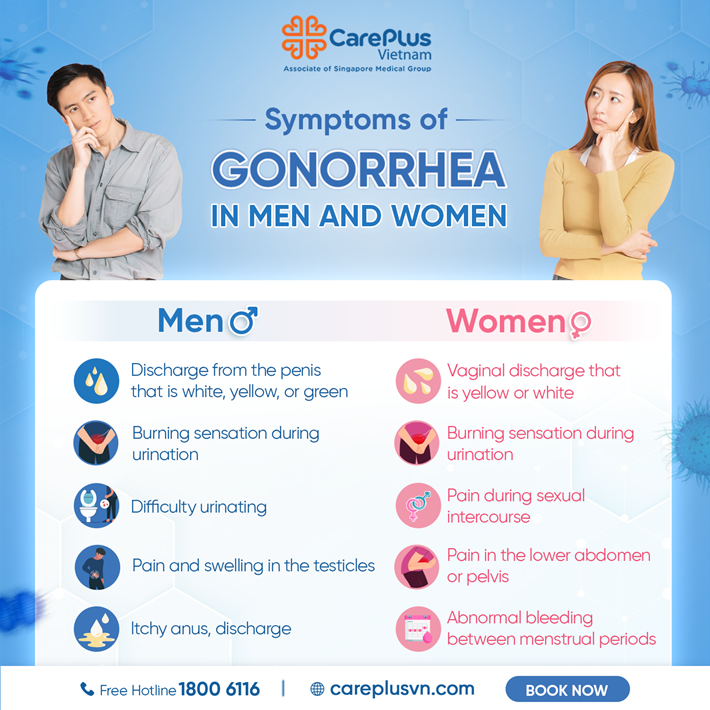WHAT ARE THE SYMPTOMS OF GONORRHEA IN MEN AND WOMEN? ARE THE COMPLICATIONS OF GONORRHEA DANGEROUS?
Most cases show symptoms within 3 to 5 days after infection, but some may not show any symptoms at all. The symptoms can vary between men and women.

8/15/2024 1:32:45 PM
Gonorrhea is a disease that can cause serious impacts on health and quality of life for those who contract it. However, not everyone is aware of what gonorrhea is, what causes it, its symptoms, complications, or how to detect it. This article will provide essential information related to these questions.
What Causes Gonorrhea?
Gonorrhea is caused by the bacteria *Neisseria gonorrhoeae*. This bacterium is commonly found in the vagina and cervix of women, as well as in the eyes, mouth, anus, and particularly in the urethra of men.
How Is Gonorrhea Transmitted?
- Sexual Transmission: This is the primary cause, accounting for about 90% of gonorrhea cases. The bacteria are transmitted through contact with infected areas such as the penis, vagina, mouth, or anus, even without ejaculation. The risk is higher for those who have multiple sexual partners, particularly when engaging with sex workers, in homosexual relationships, or in bisexual relationships.
- Mother-to-Child Transmission: An infected mother can pass the disease to her child during natural childbirth without proper intervention. During labor, the baby may come into contact with the bacteria in the mother's vagina, leading to infection. It's also important for the mother to ensure that pus or other secretions do not come into contact with the baby during care.
- Blood Transmission: The gonorrhea bacteria can be present in the blood of an infected person. If you receive blood from an infected person or share needles with someone who has gonorrhea, the risk of infection is very high.
- Indirect Transmission: Though rare, gonorrhea can be transmitted indirectly through sharing personal items like clothes. However, the gonorrhea bacteria are quite weak and die quickly outside the body, so this mode of transmission is less common.
Signs and Symptoms of Gonorrhea
Most cases show symptoms within 3 to 5 days after infection, but some may not show any symptoms at all. The symptoms can vary between men and women:
In Men
This includes cisgender men, transgender women, and non-binary individuals with a penis. They often show more obvious symptoms when infected with gonorrhea, such as:
- White, yellow, or green discharge from the penis.
- Burning sensation when urinating.
- Difficulty urinating.
- Pain and swelling in the testicles.
In Women
This includes cisgender women, transgender men, and non-binary individuals with a vagina. They often have less noticeable symptoms, which is why testing is crucial for detecting exposure. Some common signs include:
- Unusual yellow or white vaginal discharge.
- Lower abdominal or pelvic pain.
- Pain during sexual intercourse.
- Burning or pain when urinating.
- Difficulty urinating.
- Abnormal bleeding between periods.
In All Genders
Gonorrhea can affect anyone in the throat (through oral sex on the genitals or anus) or the rectum (through anal sex). These types are less common but have specific symptoms, such as:
- Itchy, sore, or painful throat, and difficulty swallowing.
- Itching, discharge, or pain in the anus, especially during bowel movements.
Is Gonorrhea Dangerous? Common Complications
If not treated promptly and correctly, gonorrhea can cause many dangerous complications for both men and women. Some of the most serious complications include:
- Causing Infections in Reproductive Organs: Including prostatitis, urethritis, vaginitis, pelvic inflammatory disease, and cervicitis.
- Affecting Quality of Life: People with gonorrhea may feel self-conscious and uncomfortable in social interactions. Additionally, sexual function and satisfaction may decrease, leading to fear of intimacy with partners.
- Impacting Fertility: In women, gonorrhea can damage the uterus, ovaries, and fallopian tubes, increasing the risk of infertility, ectopic pregnancy, and miscarriage. Babies born to infected mothers may also suffer from severe complications such as skin infections, blood infections, and eye infections.
- In men, gonorrhea increases the risk of prostatitis, which can affect fertility and increase the likelihood of infertility.
If you notice any of the above signs, it is essential to undergo testing and treatment as early as possible. Early detection and treatment can help cure gonorrhea and restore normal reproductive health.